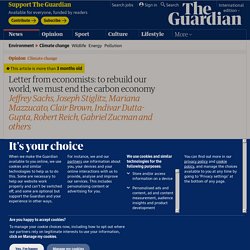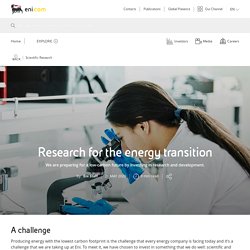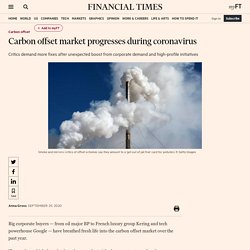

Lisbon to use Council presidency to ensure ‘green’ recovery. How to turn industrial carbon emissions into building materials. 'Energy needed a digital revolution – and we are it' Letter from economists: to rebuild our world, we must end the carbon economy. From deep-rooted racism to the Covid-19 pandemic, from extreme inequality to ecological collapse, our world is facing dire and deeply interconnected emergencies.

But as much as the present moment painfully underscores the weaknesses of our economic system, it also gives us the rare opportunity to reimagine it. As we seek to rebuild our world, we can and must end the carbon economy. Even as climate breakdown looms around the corner, the pressure to return to the old carbon-based economy is real – and all the more dangerous, given the fundamental instability of an economy rooted in injustice. Sources of large-scale human suffering, such as crop failures, water shortages, rising tides, wildfires, severe weather, forced migration and pandemics, go hand-in-hand with a warming world. It is Black people in America, for instance, who bear some of the highest rates of exposure to polluted air.
Governments must actively phase out the fossil fuel industry. Interview: Former EU climate chief Connie Hedegaard on the bloc’s low-carbon future. UK petrol and diesel car ban brought forward to 2030. LONDON — The U.K. will bring forward a ban on the sale of new petrol and diesel cars to 2030, Boris Johnson will confirm Wednesday, as part of a “10-point plan” for the country to reach net-zero carbon emissions by 2050.

The long-awaited document will include further commitments to invest in offshore wind, nuclear energy and carbon capture, as well as hydrogen energy production — with a plan to power the first “hydrogen town” by the end of this decade. Johnson, who will host the pivotal COP26 U.N. climate summit in Glasgow next year, is expected to position the fight against climate change as a key pillar of the government’s domestic and international agenda next year. Bringing Buildings on Track to Reach Zero-Carbon by 2050 - European Climate Foundation. Analysis forecasts eight-fold increase in hydrogen production by 2050. Member states still dragging their feet on circular economy. La Pologne s’accroche à son charbon, par Agathe Osinski & Matthias Petel (Le Monde diplomatique, novembre 2020) En 2019, la Pologne a extrait 61,6 millions de tonnes de charbon (hors lignite), soit 95 % de la production totale de l’Union européenne.

Si, depuis 2012, ce chiffre a baissé de 20 %, la réduction paraît faible comparée à celle de l’Allemagne durant la même période : 76 %, en dépit de réserves plus importantes. Toutefois, ce riche voisin a les moyens d’importer l’énergie dont il a besoin et demeure le principal consommateur de produits houillers, avec 35 % du total européen en 2019. Déjà perçus comme rétrogrades du fait de leur attachement à un clergé catholique très conservateur, les Polonais seraient-ils également indifférents au changement climatique ?
Certaines études d’opinion montrent qu’ils figurent en effet parmi les citoyens les moins inquiets à ce sujet au sein de l’Union européenne, mais d’autres sondages, de même que les marches pour le climat organisées à l’automne 2019 à Varsovie, suggèrent que cette perception est en train d’évoluer. Interview: How Portugal plans to become a green hydrogen powerhouse. Europe set for coal-free power by 2030 - analysis. Norway’s supreme court to hear landmark case on Arctic oil drilling. The Future of Energy Storage. Impact of COVID-19 increases urgency of digital technology investments for oil and gas; workforce skills gaps hinder ROI. Impact of COVID-19 increases urgency of digital technology investments for oil and gas; workforce skills gaps hinder ROI.
Data analytics and insights is one of the top-three trends expected to positively impact oil and gas Three in five oil and gas workers need to be reskilled or upskilled 92% agree the ability to reskill will determine their company’s success over the next three years Ninety percent of oil and gas executives agree that investments in technology and workforce are essential to surviving current market conditions, according to a new EY survey: Oil and Gas Digital Transformation and the Workforce Survey 2020.

Green groups call for end to EU hydropower subsidies. IN DEPTH: New 10-year environment plan set to fix Europe’s green deal in law. A dozen governments back 55% emissions cut by 2030, but divisions remain. Research for the energy transition. The energy transition Natural gas remains at the heart of our strategy to support the energy transition.

With its low carbon impact, it can be used to replace more polluting sources during the period of time when the energy system is being converted to renewables. We are developing gas pilot and demonstration plants that make use of the technology we have developed so far. For example, our system that transforms methane into methanol in small plants that can be located off-shore or floating, allowing small quantities of natural gas to be used which would otherwise destined for flaring. In addition, in 2015, we established the Energy Transition Programme focused on developing low carbon technologies, in particular the methanol chain and the use of CO2.
Climate Change and COVID-19 – IMF F&D. Pulp and paper in a net-zero transition. This discussion paper presents a short summary of the conclusions from a study carried out by Material Economics in 2019 – Industrial Transformation 2050 – Pathways to Net Zero Emissions from Heavy Industry‘ – and draws out the main implications for the pulp and paper industry.

It has been written by Material Economics on behalf of the Finnish Innovation Fund Sitra and the Cambridge Institute for Sustainability Leadership, CISL. The pulp and paper industry will be profoundly affected by the broader industrial transformation to net-zero emissions of CO2. The traditional challenge has been to provide an answer to how the remaining fossil CO2 emissions will be eliminated.
This remains critical, but it may not be the most important issue. The main impact of a net-zero transition on pulp and paper companies may instead be through entirely different channels, presenting both challenges and opportunities. These changes will pose fundamental questions for pulp and paper companies. Ten seeds for a circular ecosystem. 1.

Summary. UK pushes for a clean energy future. Carbon offset market progresses during coronavirus. Big corporate buyers — from oil major BP to French luxury group Kering and tech powerhouse Google — have breathed fresh life into the carbon offset market over the past year.

The market, which dates back to the 1970s but picked up momentum after the 1997 Kyoto agreement on climate change, has faced significant setbacks in recent years, including a price crash after the 2008 financial crisis and the closure in 2010 of the Chicago Climate Exchange, a US trading platform. Many in the sector feared the coronavirus crisis would deal a fresh blow to the offsetting industry, in part by reducing emissions from industries like aviation that were set to become big buyers.
In fact broader corporate demand for voluntary carbon offsets has increased this year, according to the latest report by Ecosystem Marketplace, a non-profit that provides information on environmental markets. The carbon market falls into two categories. Boosters and doubters. Eliminating pollution. Adaptation challenges and opportunities for the European energy system. Focus on green recovery. Denmark proposes pathway for ‘sustainable’ biomass. The Danish government and a majority coalition of eight parties have proposed stricter legal requirements for wood biomass used for heat and electricity in the country.

The agreed proposal will ensure biomass is produced sustainably, securing a climate-friendly transition from coal in the short run while other alternatives are being pursued in the long term. Documents : Les perspectives énergétiques mondiales, horizon 2040. Les scénarios de l’Agence internationale de l’énergie. "En mars dernier, Futuribles a lancé une nouvelle série consacrée au climat et à la transition écologique : des enjeux de long terme essentiels qui nous semblaient peu ou mal pris en compte par les gouvernements.

Juste après s’est propagée la pandémie de Covid-19, assortie d’une crise économique internationale majeure qui va pousser la plupart des pays du monde à mettre en place des plans de relance pour y faire face. Documents : Prospective des transitions énergétiques. Entre modélisation économique et analyse des scénarios stratégiques. "Alors que de nombreux pays réfléchissent aux réponses à apporter à la crise économique issue de la pandémie de Covid-19 et que se pose la question de leur articulation avec les stratégies de lutte contre le changement climatique, quel peut être l’apport de la prospective des transitions énergétiques ? Prolongeant la série « Énergie-climat » ouverte dans nos colonnes en mars dernier, Patrick Criqui et Henri Waisman proposent une analyse des différents outils de prospective développés depuis une cinquantaine d’années pour éclairer les décisions en matière de transition énergétique.
'It'll be around forever': fossil fuel workers switch to new jobs in renewables. “This is absolutely massive for me,” Mustafa Hamed explains. The 21-year-old from Wigan first came to Britain from Iraq as a child more than 17 years ago in the wake of a bitter war steeped in oil. Today, he is helping to build what will be the world’s biggest offshore windfarm off the east coast of England. Hamed joined Jones Bros Civil Engineering UK, a Welsh engineering firm, as an apprentice last year. ChemicalWatch. Germany plans stricter measures to reach renewables targets. Live: Chinese President Xi Jinping speaks at UNGA's General Debate. New baseline could soften impact of EU’s possible 55% CO2 cut target. Interactive Map Lets You Explore the Forces Transforming the Oil and Gas Industry. There are many questions as to how the oil and gas industry will respond to the social, political, and economic forces transforming the sector as the world transitions to lower carbon energy sources.
On the one hand, oil and gas are still being used to meet more than half of the world’s primary energy needs. On the other, significant challenges are stacking up, not least of which is the COVID-19 pandemic. COVID-19 has sent oil and gas demand plunging — turning oil prices negative for the first time ever — slashed industry jobs, and left uncertainty in its wake. Despite these massive challenges, the industry will continue to play an important part in the transformation of the global energy landscape for the foreseeable future. New roadmap to decarbonise European transport by 2040 - Greenpeace European Unit. Brussels – New research, published by Climact and NewClimate Institute and commissioned by Greenpeace Belgium, offers a roadmap for decision-makers to decarbonise the European transport sector by 2040, powering it with renewable energy, without relying on biofuels. The analysis describes how Europe can swiftly revolutionise the way people and goods move and deliver a fair EU contribution to limiting global warming to 1.5°C. [1] While greenhouse gas emissions (GHG) from other sources have been slowing or dropping, emissions from transport have continued to climb in the EU.
Transport-related emissions were 28% greater in 2017 than in 1990. EPRS ATA(2020)652063 EN. Goal 7: Affordable and Clean Energy. Phasing out coal – a just transition approach. Towards a just transition: coal, cars and the world of work. The role of trade unions and social dialogue is key in demonstrating the major differences between coal-based energy generation and the automobile industry.
This book presents two faces of a just transition towards a net-zero carbon economy by drawing lessons from these two carbon-intensive sectors. The authors regard just transition not as an abstract concept, but as a real practice in real workplaces. While decarbonisation itself is a common objective, particular transitions take place in work environments that are themselves determined by the state of the capital-labour relationship, with inherent conflicts of interest, during the transition process.
How the little-known Energy Charter Treaty is holding environmental policy hostage - Equal Times. Is it possible to take urgently needed action on climate change while simultaneously protecting the fossil fuel industry, the very cause of climate imbalance? Today, the 53 signatory countries of the Energy Charter Treaty (ECT), including the European Union, which has made its Green Deal (aimed at making Europe carbon neutral by 2050) a guiding policy principle for the coming years, allow energy companies to sue countries for passing laws that run counter to their economic interests.
3 trends that will transform the energy industry. As energy use falls, electrification and renewable energy will keep expanding. A distributed energy network will replace the traditional utility business model. Eight EU countries back natural gas in energy transition. BP enjoys share bounce after unveiling plans to shift away from fossil fuels. BP slashes dividend as Covid pushes it to record $16.8bn loss.
Apple's 2030 carbon-neutral pledge covers itself and suppliers. A just transition to a greener, fairer economy. Can a hydrogen boom fuel a green recovery for Britain? The power industry’s shift to sustainable energy. Europe’s stranded assets: Mapped. Multibillion-dollar gas projects in jeopardy as global market collapses.